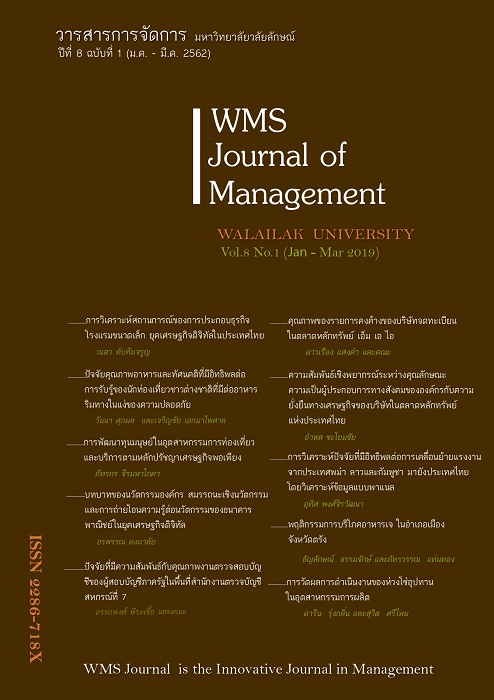Accrual Quality of Companies Listed on Market for Alternative Investment
Main Article Content
Abstract
The objective of this paper is to study accrual quality of companies listed on Market for Alternative Investment. The accrual quality was analyzed using the model developed by McNichols (2002) and used in Francis et al. (2005). The analysis was based on the data from 2009-2015 financial statements of 70 companies listed on Market for Alternative Investment, resulting in 296 firm-years. The results showed that most of the companies listed on the Market for Alternative Investment had the accrual quality above an average of the market. When comparing the accrual quality of small business with which of big business, using Independent t–Test statistic, the result showed no statistical difference at 95% confidence.
Article Details
How to Cite
Sangkum, D., Sampet, J., & Sittisombut, M. (2019). Accrual Quality of Companies Listed on Market for Alternative Investment. WMS Journal of Management, 8(1), 57–63. Retrieved from https://so06.tci-thaijo.org/index.php/wms/article/view/168305
Section
Research Articles-Academic Articles
References
Chansarn, T. (2015). The relationship between debt and earnings quality of listed companies in Market for Alternative Investment (MAI). BU Academic Review, 14(1), 71-87.
Dechow, P., & Dichev, I. (2002). The quality of accruals and earnings: The role of accrual estimation errors. The Accounting Review, 77(Supplement), 35-59.
Dechow, P., Sloan, R., & Sweeney, A. (1995). Detecting earnings management. The Accounting Review, 70, 193–225.
Francis, J., LaFond, R., Olsson, P., & Schipper, K. (2005). The Market Pricing of Accruals Quality. Journal of Accounting Economics, 39(4), 295-327.
Hui, H., Wan Mohamed Radzi, C. W. J., Salarzadeh Jenatabadi, H., Abu Kasim, F., & Radu, S. (2013). The impact of firm age and size on the relationship among organizational innovation, learning, and performance: A moderation analysis in Asian food manufacturing companies. Interdisciplinary Journal of Contemporary Research in Business, 5(4), 166-174.
Jones, J. (1991). Earnings management during import relief investigations. Journal of Accounting Research, 29, 193–228.
Junhom, S. (2011). Earnings quality of family-owned and managed firms. Independent Study. (Master‘s Thesis, Thammasat University, Thailand).
Komutputipong, N. (2014). Earnings quality measurement for security analysis. Chulalongkorn Business Review, 36(139), 1-18.
McNichols, M. (2002). Discussion of the quality of accruals and earnings: The role of accrual estimation errors. The Accounting Review, 77(Supplement), 61-69.
Netrakat, S. (2011). The relationship between earnings management and growth opportunity of listed companies in Market for Alternative Investment (MAI). (Master‘s Thesis, Thammasat University, Thailand).
The Stock Exchange of Thailand. (2017). New Listed Companies/Securities. Retrieved from https://www.set.or.th/set/ ipo.do?view=summary&format=html&type=security.
Wattanaphun, P. (2016). Accrual quality of companies listed in Services Industry in The Stock Exchange of Thailand. In O. Maneesong (ed.), BMRC The 9th Business Management Research Conference. Paper presented at the Proceedings of the 9th Business Management Research Conference, Chiang Mai, 72-91.
Dechow, P., & Dichev, I. (2002). The quality of accruals and earnings: The role of accrual estimation errors. The Accounting Review, 77(Supplement), 35-59.
Dechow, P., Sloan, R., & Sweeney, A. (1995). Detecting earnings management. The Accounting Review, 70, 193–225.
Francis, J., LaFond, R., Olsson, P., & Schipper, K. (2005). The Market Pricing of Accruals Quality. Journal of Accounting Economics, 39(4), 295-327.
Hui, H., Wan Mohamed Radzi, C. W. J., Salarzadeh Jenatabadi, H., Abu Kasim, F., & Radu, S. (2013). The impact of firm age and size on the relationship among organizational innovation, learning, and performance: A moderation analysis in Asian food manufacturing companies. Interdisciplinary Journal of Contemporary Research in Business, 5(4), 166-174.
Jones, J. (1991). Earnings management during import relief investigations. Journal of Accounting Research, 29, 193–228.
Junhom, S. (2011). Earnings quality of family-owned and managed firms. Independent Study. (Master‘s Thesis, Thammasat University, Thailand).
Komutputipong, N. (2014). Earnings quality measurement for security analysis. Chulalongkorn Business Review, 36(139), 1-18.
McNichols, M. (2002). Discussion of the quality of accruals and earnings: The role of accrual estimation errors. The Accounting Review, 77(Supplement), 61-69.
Netrakat, S. (2011). The relationship between earnings management and growth opportunity of listed companies in Market for Alternative Investment (MAI). (Master‘s Thesis, Thammasat University, Thailand).
The Stock Exchange of Thailand. (2017). New Listed Companies/Securities. Retrieved from https://www.set.or.th/set/ ipo.do?view=summary&format=html&type=security.
Wattanaphun, P. (2016). Accrual quality of companies listed in Services Industry in The Stock Exchange of Thailand. In O. Maneesong (ed.), BMRC The 9th Business Management Research Conference. Paper presented at the Proceedings of the 9th Business Management Research Conference, Chiang Mai, 72-91.

